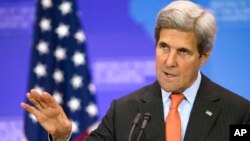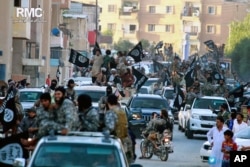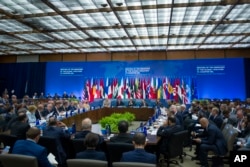While the Islamic State group continues to lose ground and fighters in Iraq and Syria, U.S. Secretary of State John Kerry says the militant organization is morphing into a different type of threat that likely will be more difficult to defeat.
Speaking at a meeting of Islamic State's foes Thursday, Kerry told foreign and defense ministers from more than 30 nations that "the tide has turned."
"Our coalition and our partners on the ground have driven Daesh out of nearly 50 percent of the territory that it once controlled in Iraq, and 20 percent of the territory [it formerly controlled] in Syria," Kerry added, using Daesh, an Arab acronym, to refer to the Islamic State group.
The world can look forward to a time when Islamic State is driven completely out of Iraq and Syria, the top U.S. diplomat said, and "the day that happens will mark a critical turning point in the fight against Daesh."
Even now, Kerry said, the U.S.-led coalition can welcome the fact that the IS fighting force is about one-third smaller than it was last year. Foreign fighters recruited by IS in the past have begun to drift away from the terrorists' front lines, since reduced revenue has slowed payment of their salaries, and the group's search for fresh recruits has become less effective.
Without a territorial base, Kerry said Islamic State will no longer be able to boast it is a new "caliphate" to which foreign fighters can flock.
The bad news, however, is that even when the coalition achieves its military goals in Iraq and Syria, the fight against the Islamic State group will be far from over. Kerry said IS is "resilient and realistic enough to know when it needs to change."
Anthony Cordesman of the Center for Strategic and International Studies told VOA the Islamic State group is now much more willing to provoke terrorism than even al-Qaida was in the past.
“We can contain it, we can limit it, we can defeat parts of it in detail, but none of it is going to go away,” Cordesman said. He is a former senior U.S. government official and consultant with decades of experience on national-security issues.
What to expect
Islamic State is currently making a concerted effort to forge the remnants of its "caliphate" into a global network of murderers, "whose only real purpose," Kerry said, "is to kill as many people in as many places as possible."
Islamic State formerly relied on large sums of money, derived from illegal oil sales and "taxes" extorted from residents of the areas it controlled, to pay its foot soldiers. Even though those revenues have declined sharply, IS now needs relatively little money to inspire deadly attacks via social-media posts.
The Islamic State pattern of terrorism has been transformed, participants at Thursday's meeting said, from planning attacks meticulously to depending on attack plots that do not include an escape plan for those involved, because the extremists do not expect to get out alive and feel no need to conceal their identities.
Islamic State is now an organization trying to expand its reach by developing expertise in more languages, and by establishing contacts in additional countries and regions, U.S. officials say.
“It is looking for areas of vulnerability, and it will be eager to try to exploit them,” Kerry said.
How to stop it
Government officials and experts said wiping out the terror group starts with close communications, and by countering Islamic State's message.
Kerry called on representatives of other nations at the State Department meeting to emphasize that Islamic State actions have "no justification in religion, logic, history or law."
He also urged coalition members to increase information sharing and to break down bureaucratic barriers that make it difficult for authorities to identify potential terrorists before they can act.
The United States has information-sharing agreements with 55 international partners in the fight against terrorism, and at least 50 countries provide foreign terrorist fighter profiles to Interpol.
But even when authorities receive intelligence indicators about an attack, Cordesman said, those signals are sometimes lost in the flood of other data — “literally hundreds of thousands of different indicators a day.”
The CSIS expert called for careful, slow steps to improve communications coordination, while simultaneously sorting out and reinforcing the methods that work best.
“Careful, cautious planning is critical," Cordesman said, "and rushing out to do anything, particularly after more than a decade of effort to find the quick and easy solutions, is probably going to do more harm than good."











